#WrestleTokyo: Lopez Sets Up Shot at Historic 4th Gold; Fumita, Gray Make Finals
Sunday, August 1, 2021 - 12:22 By Ken Marantz

CHIBA, Japan (August 1) --- After not budging in the bottom of the par terre position, Mijain LOPEZ (CUB) stood up and did a few hops like a boxer showing he wasn't affected by the best his opponent could hit him with.
Lopez withstood everything longtime rival Riza KAYAALP (TUR) could throw his way to remain on the path toward a unique place in Olympic history with a 2-0 victory in the semifinals of the Greco-Roman 130kg division on Sunday night at Makuhari Messe Hall.
Both of Lopez's points came on passivity calls as the Cuban star kept alive his hopes of joining Kaori ICHO (JPN) as the only wrestlers in Olympic history to win four gold medals.
In Monday night's final, Lopez will face 2019 world bronze medalist Iakobi KAJAIA (GEO), who clinched a medal in his second Olympic appearance by defeating Yasmani ACOSTA (CHI) 1-1 on last-point criteria.
In other action, reigning world champions and top seeds Kenichiro FUMITA (JPN) and Adeline GRAY (USA) both advanced to their respective finals. Fumita, a two-time world champion making his first Olympic appearance, will have a shot at the gold at Greco 60kg, while Gray will look to add the women's 76kg Olympic crown to her five world titles.

Lopez and Kayaalp have now met in three consecutive Olympics, and the Cuban has come out on top in all three, having dispatched Kayaalp in the semifinals at London 2012 and the final at Rio 2016. The last time Lopez lost to anyone was in 2015 at the hands of Kayaalp, who beat him for one of his three world titles.
"This was definitely my most difficult bout and win against Riza," Lopez said. "The match in the Rio Olympics final was one-sided. My matches are mostly about dedication and preparation. Tomorrow I have to go with the same technique and I am prepared for it."
The 38-year-old Lopez, who won the last of his five world golds in 2014, has competed in just two international tournaments since Rio, with the most recent being a triumphant run at the 2019 Pan American Games in Lima.
But he has looked sharp on the mat at Makuhari Messe, where he scored a pair of technical fall victories to set up his clash with Kayaalp. In the first period, he turned the Turk in the par terre position, but the points were wiped out when it was determined he used his legs for leverage.
"The judges made a bad decision for the challenge," Lopez said. "But because I had established myself in the bout, it did not matter."
He then failed to turn Kayaalp in a second shot at par terre in the second period. With just over a minute left, Lopez was himself put in the par terre, giving Kayaalp a chance to turn the tide by turning him over. But the Cuba kept a rock solid base and, when he got up, gave the display of confidence.
Also Read: Mijain Lopez, too big to fail
The other semifinal featured a rare occurrence, as there were three passivity calls, with the requisite two points awarded, but not one battle in the par terre position. The two times that Acosta could have put Kajaia into par terre, he opted to continue the match from the standing position, including when the Georgian was tagged for passivity with 1:20 left.
The 27-year-old Kajaia, meanwhile, got his passivity point in the second period. But when he failed to heed the referee's instruction to put both of his knees on the mat, he forfeited the par terre and the two were put back on their feet.
It did little to diminish the elation Kajaia felt over his accomplishment. "It has been my goal for the past 27 years" he said. "Tomorrow will be a very spectacular match. I can’t say anything else. Today everything went well. So tomorrow I’ll only go forward, not step back."
Acosta, who is just the second Chilean wrestler in history to appear in the Olympics, will now have a chance for a bronze medal, which would be his country's first at the Tokyo Olympics.
Cuba will have a second wrestler in Monday's finals as Luis ORTA SANCHEZ (CUB) set up a gold-medal clash at Greco 60kg with Fumita by overwhelming the slippery Victor CIOBANU (MDA) by 11-0 technical fall in the semifinals.
 Kenchiro FUMITA (JPN) will wrestle for gold at 60kg. (Photo: UWW / Tony Rotundo)
Kenchiro FUMITA (JPN) will wrestle for gold at 60kg. (Photo: UWW / Tony Rotundo)
It marks the second straight Olympics that the final of the lightest Greco weight class will be a Japan-Cuban clash. In Rio, Ismael BORRERO MOLINA (CUB) defeated Shinobu OTA (JPN) in the 59kg final.
That result has provided motivation for Fumita, who won his second career world title in 2019. He and Ota were teammates and rivals at Nippon Sports Science University, with Fumita eventually winning out between them to earn the ticket to the Tokyo Olympics.
"Five years ago in Rio, I watched Ota get a medal right in front of my eyes," Fumita said. "I thought, 'I want that.' But to surpass him, the only way is to win the gold."
 Luis ORTA SANCHEZ (CUB) made it to the 60kg final in Tokyo. (Photo: UWW / Kadir Caliskan)
Luis ORTA SANCHEZ (CUB) made it to the 60kg final in Tokyo. (Photo: UWW / Kadir Caliskan)
By assuring himself of a silver medal, Fumita has extended a streak of Japanese men medaling at every Olympics dating back to Helsinki 1952. "In recent years, the women have been amazing, and the men have been continuing the streak," Fumita said. "I definitely wanted to keep it going."
Fumita is aiming to become Japan's first Olympic Greco champion since Atsuji MIYAHARA (JPN) won the 52kg gold at Los Angeles 1984.
In the semifinals, Fumita scored four points in the second period to defeat Lenur TEMIROV (UKR) 5-1. The Japanese kept his composure as he trailed 1-1 on criteria, then scored a takedown and gut wrench for the winning points.
In the women's 76kg division, 2019 world bronze medalist Alice ROTTER FOCKEN (GER) assured her country of its first women's Olympic wrestling medal in what she says will be her final tournament when she knocked off local favorite Hiroe MINAGAWA (JPN) 3-1 in the semifinals.
 Aline ROTTER-FOCKEN (GER) reached the final at 76kg in Tokyo. (Photo: UWW / Kadir Caliskan)
Aline ROTTER-FOCKEN (GER) reached the final at 76kg in Tokyo. (Photo: UWW / Kadir Caliskan)
With Minagawa, the 2019 world silver medalist, leading 1-1 on criteria, Rotter Focken scored with a double-leg takedown with 1:15 left, then held on to make the final in her second Olympic appearance.
"It was really exciting and stressful, but I'm really happy I could show my full potential, because I can wrestle everyone," Rotter Focken said. "Sometimes it doesn't work out, and today it did."
Rotter Focken said she is looking forward to one final clash with Gray to cap a friendly rivalry that goes back to when they were teenagers. In fact, Gray said that she invited the German to her wedding (she couldn't come due to a prior commitment).
"I'm really happy to wrestle her," Rotter Focken said. "We are good friends, and we're always said for Tokyo that we'd like to meet each other in the Olympic final. It's like a movie, we did it. I like her style of wrestling, and I'm really excited who will be the No. 1 tomorrow."
Gray, who has waited five long years to redeem herself for failing to medal in Rio, kept her golden dreams alive with a close 3-2 victory over a young, gutsy Aiperi MEDET KYZY (KGZ).
"This is so many years of hard work coming into fruition, it's incredible," Gray said. "I'm just excited to be here after such a long time."

Gray took a 2-0 lead with an activity point and stepout in the first period. With just over a minute to go in the second, Medet Kyzy came close to a takedown, but failed to complete the move as they went out of bounds.
But the Kyrgyz side challenged the call, which was rejected, giving Gray a point that would later prove decisive.
"I think that's just experience," Gray said of avoiding the takedown. "I don't panic there. I'm great at scoring points, and I do pretty well when I'm down, so even if she does get that takedown...I really feel confident that it's enough of a fire to kick me into the next gear, which sometimes I need to make these matches not as close."
The 22-year-old Medet Kyzy, a 2019 world U-23 bronze medalist, went on the attack and, with 20 seconds left, secured a takedown that cut the lead to 3-2 and which she transitioned into a lace lock. But she wasn't able to turn the veteran American, who let out a whoop of joy when time expired.
"I haven't wrestled this women, she has been cleaning house with a lot of people who I have great matches with," Gray said of Medet Kyzy. "I went in ready to battle. It was a little closer than I expected it to be, she's pretty slippery in a few positions, but I really felt that my positioning got the better of her."
Also Read: #WrestleTokyo Day 1 Morning Session reacap
In the mixed zone, Gray opened up about the disappointment she felt five years ago in Rio, when she went in as the prohibitive favorite but came out on the short end of a 4-1 loss to Vasilisa MARZALIUK (BLR) in the quarterfinals.
"It's tough to lose," Gray said. "That's what it comes down to. I had expectations for myself, and I think everyone else did last [Olympic] quad for me to do well. I had gone undefeated for 2 1/2 years leading into it, I didn't see anybody that was really going to be able to go toe-to-toe with me."
Gray said that in the intervening years, she has come to realize how a shoulder injury had led to her downfall by not admitting to herself how serious it really was.
"I didn't realize how injured I was. I had to take a year and a half off, and it took me three years before my shoulder was ready to really compete and really grind. I didn't want to blame it on the injury because losses happen, but making it here today really shows me that I had a lot of pain leading up to that tournament and I was fighting through mentally just dealing with that on a day-to-day basis.
"It wears you down a little bit more that I had expected it to. I'm just thankful that I'm healthy, that I have a great team with me and so many people willing to help."
RESULTS:
Greco-Roman
60kg
GOLD: Kenchiro FUMITA (JPN) vs Luis ORTA SANCHEZ (CUB)
SF 1: FUMITA Kenichiro (JPN) df Lenur TEMIROV (UKR), 5-1
SF 2: Luis ORTA SANCHEZ (CUB) df Victor CIOBANU (MDA), 11-0
130kg
GOLD: Mijain LOPEZ (CUB) vs Iakobi KAJAIA (GEO)
SF 1: Mijain LOPEZ (CUB) df Riza KAYAALP (TUR), 2-0
SF 2: Iakobi KAJAIA (GEO) df Yasmani ACOSTA FERNANDEZ (CHI), 1-1
Women's Wrestling
76kg
GOLD: Adeline GRAY (USA) vs Aline ROTTER-FOCKEN (GER)
SF 1: Adeline GRAY (USA) df Aiperi MEDET KYZY (KGZ), 3-2
SF 2: Aline ROTTER-FOCKEN (GER) df Hiroe MINAGAWA (JPN), 3-1

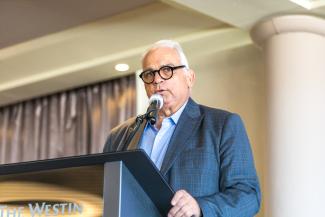
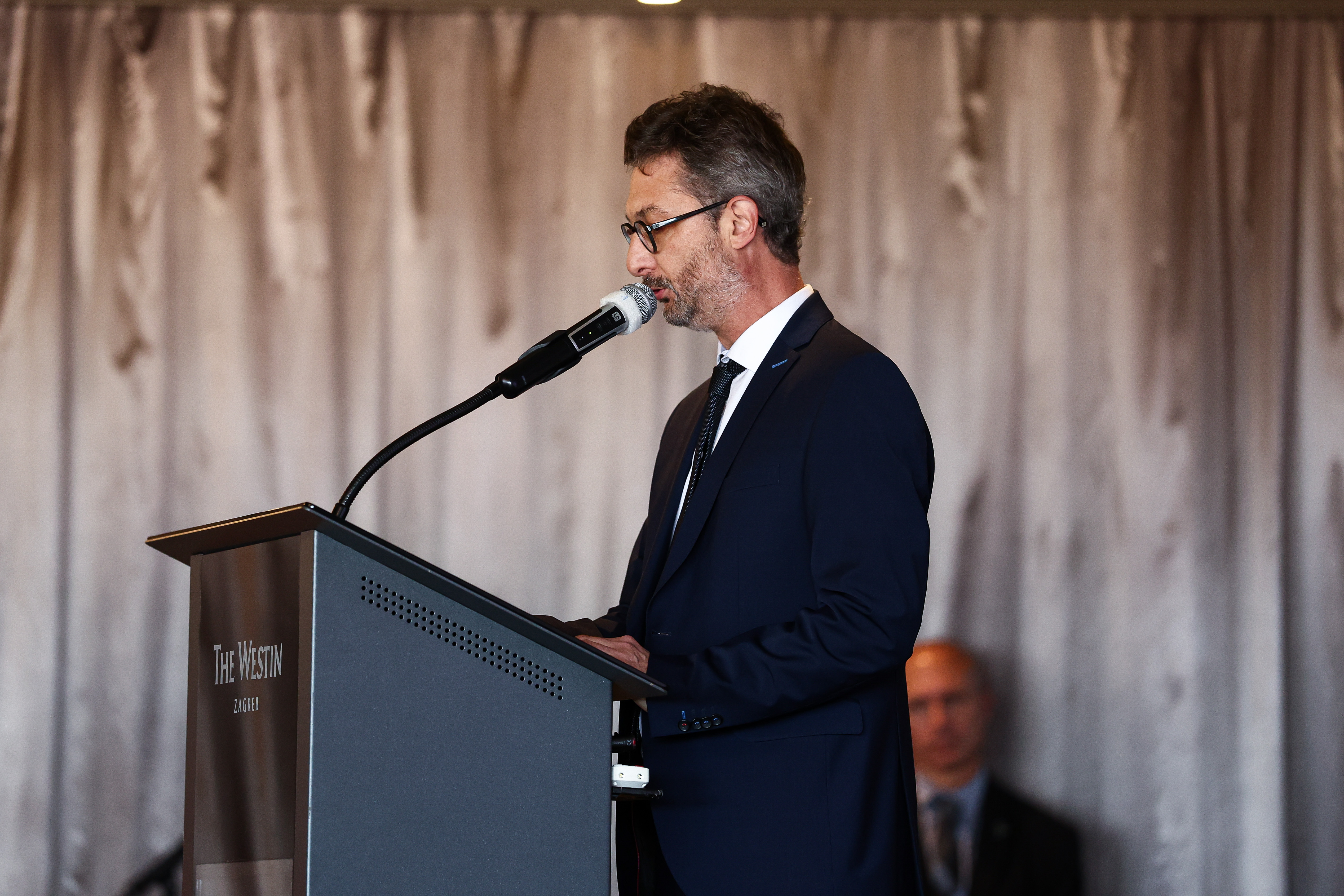 UWW Secretary General Carlos ROY welcomes the delegates to the World Conference. (Photo: United World Wrestling / Jake Kirkman)
UWW Secretary General Carlos ROY welcomes the delegates to the World Conference. (Photo: United World Wrestling / Jake Kirkman)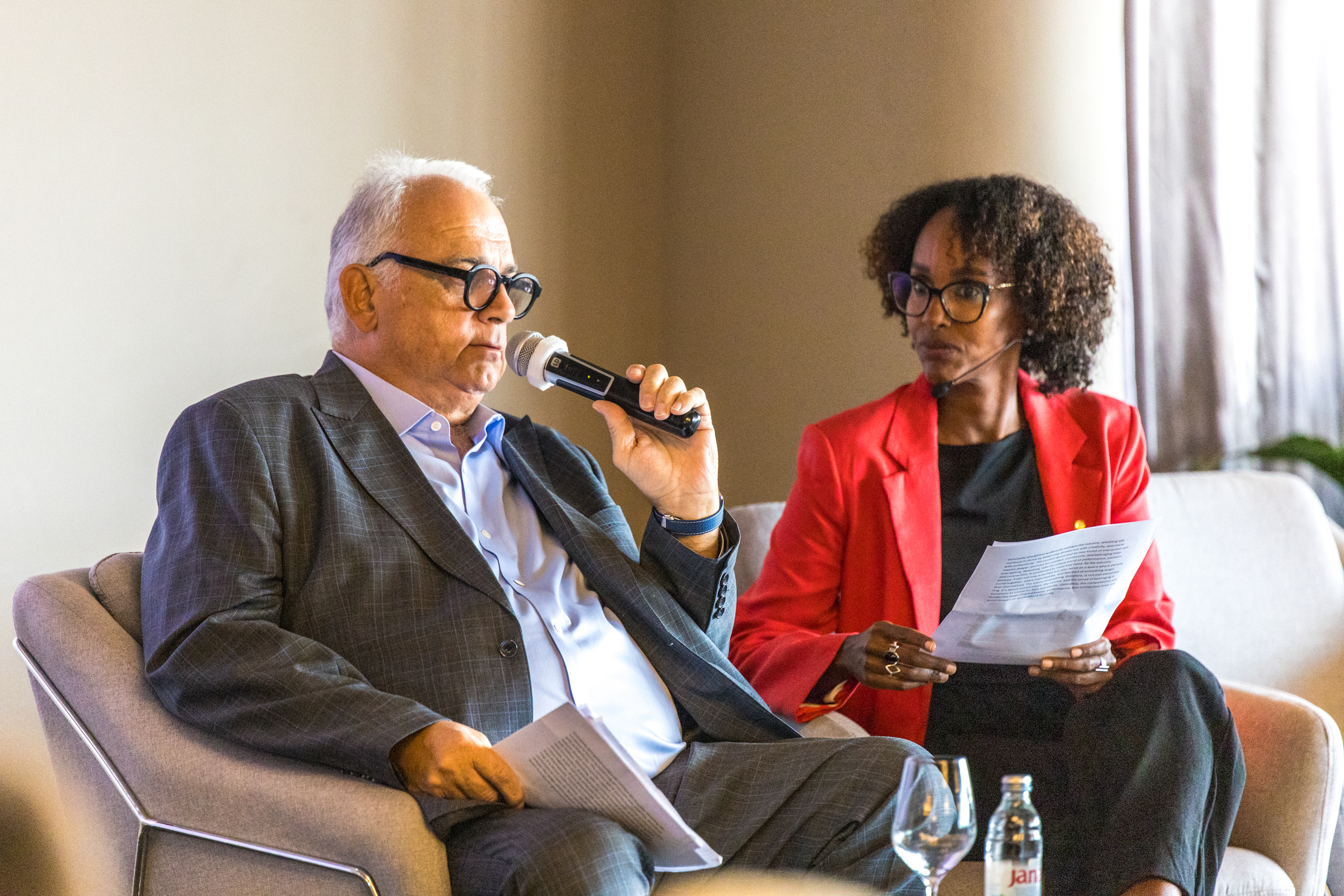 Nenad LALOVIC in a Q/A session with UWW Development Director Deqa NIAMKEY.
Nenad LALOVIC in a Q/A session with UWW Development Director Deqa NIAMKEY.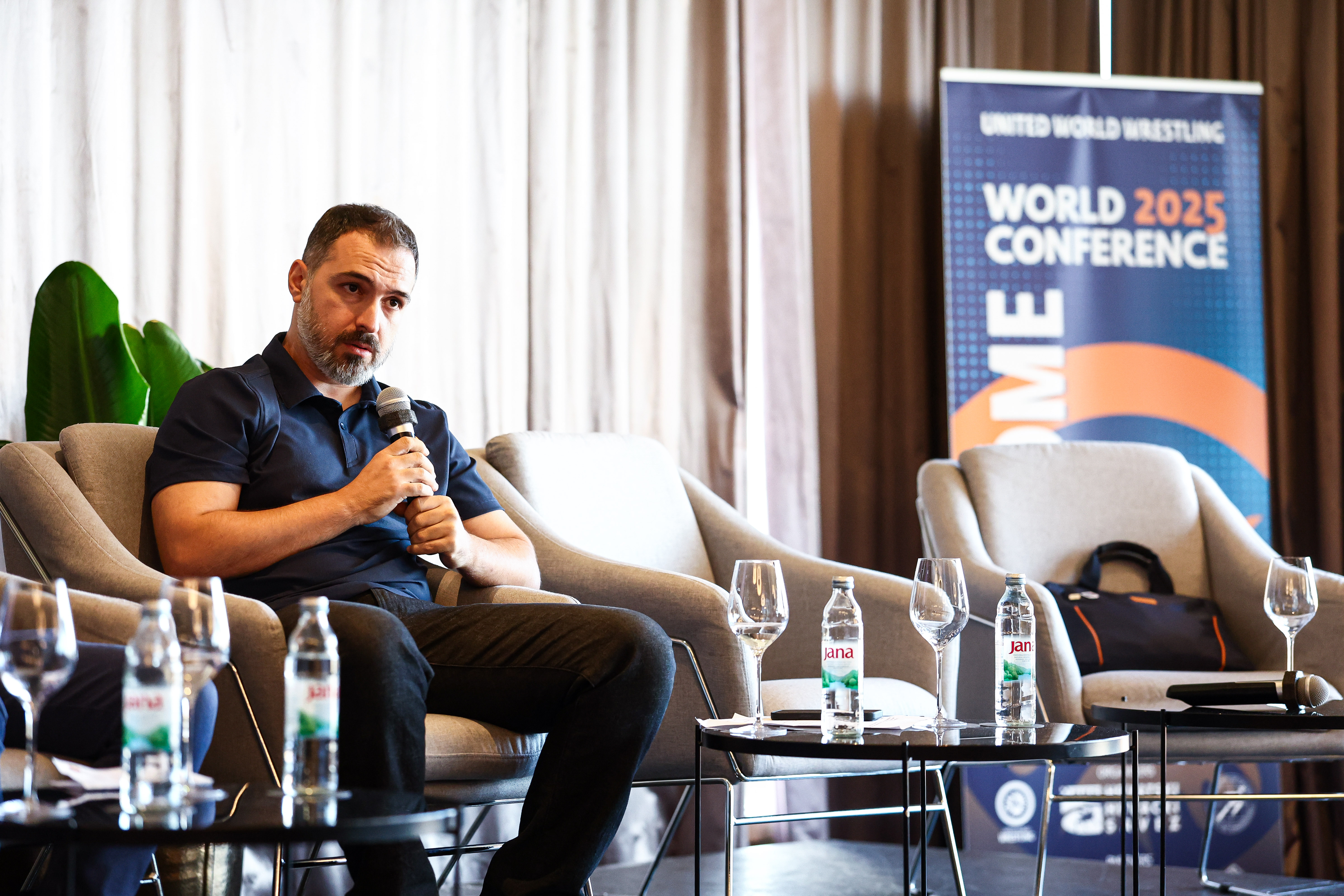 UWW Associated Styles Manager of UWW Onur SIMSEK.
UWW Associated Styles Manager of UWW Onur SIMSEK.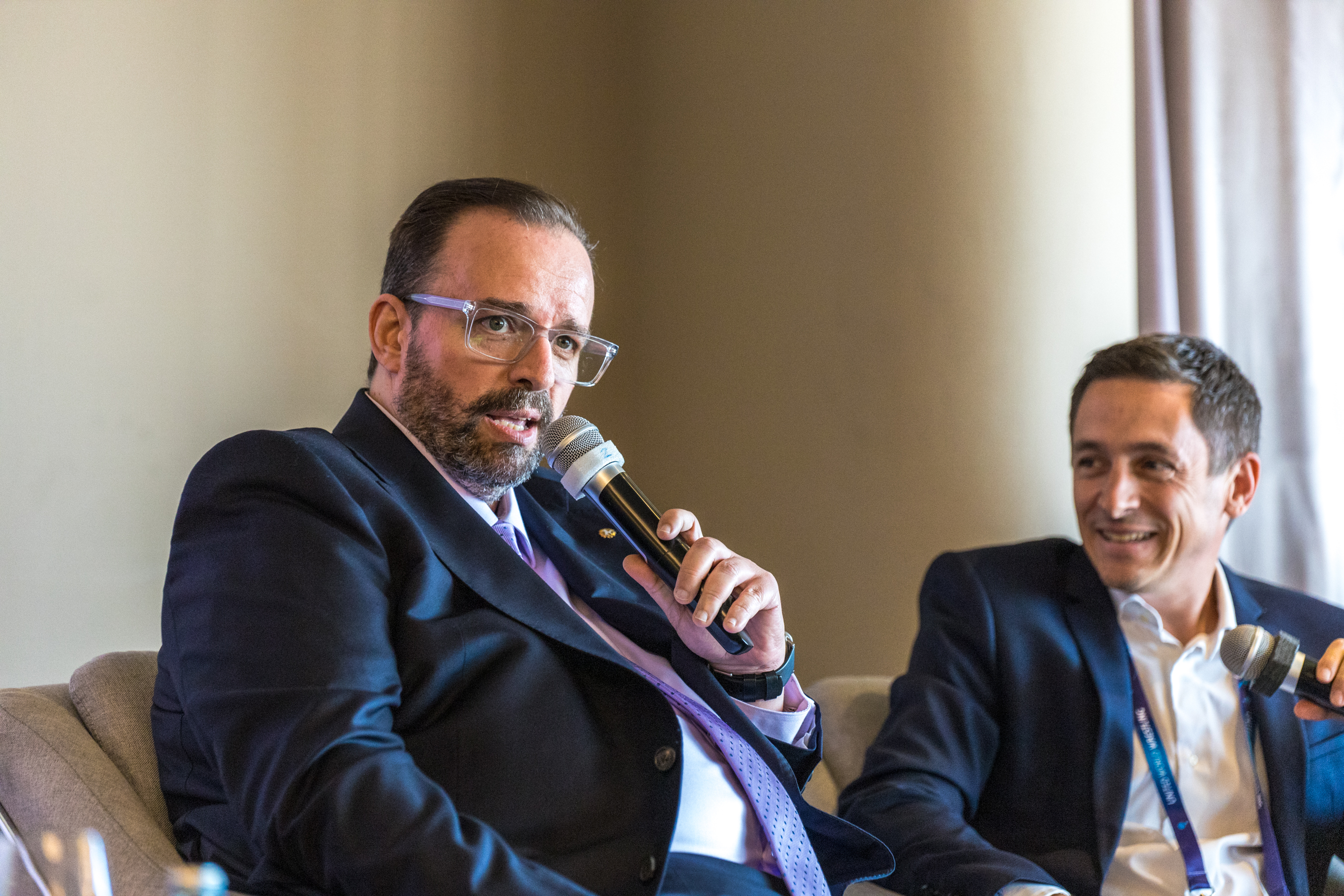 UWW Beach Wrestling Committee President Pedro SILVA.
UWW Beach Wrestling Committee President Pedro SILVA.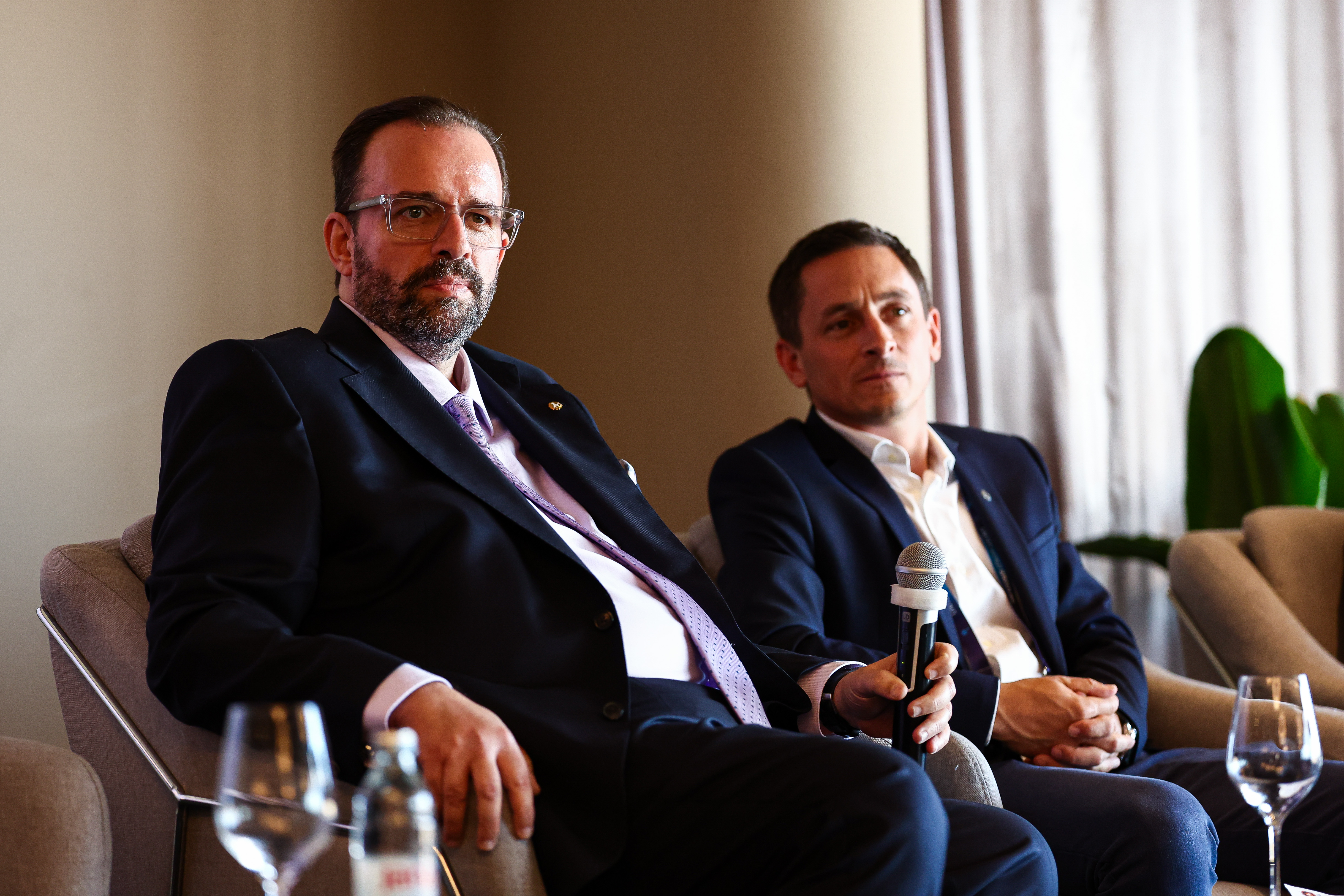 Pedro SILVA, left, and UWW Sports Director Jean-Daniel REY. (Photo: United World Wrestling / Jake Kirkman)
Pedro SILVA, left, and UWW Sports Director Jean-Daniel REY. (Photo: United World Wrestling / Jake Kirkman)
Share your thoughts.
Comments